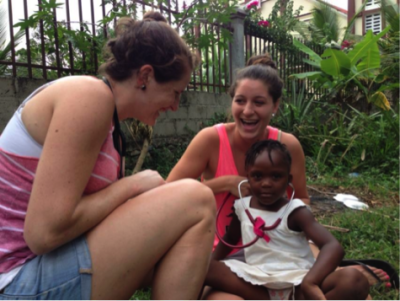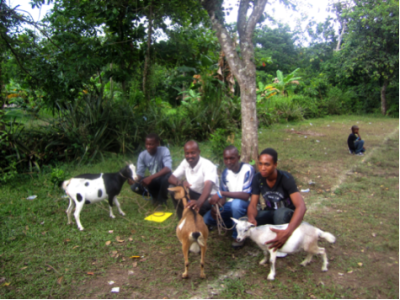SAVMA's Underserved Areas Stipend in Action
 Thursday, July 18, 2013 at 11:22AM
Thursday, July 18, 2013 at 11:22AM SAVMA's Public Health and Community Outreach Committee offers eight awards of $500 each year to help veterinary students on externships in underserved areas. Applications are accepted on a rolling basis and can be found here. Read on for how Alison Morgera from Penn spent her time in Haiti.
As a member of the Pou Sante: Amar Haiti team, I recently traveled to Thibeau, Haiti, to demonstrate the importance of the veterinary profession in all aspects of human, animal, and environmental health.  Showing little Rood how to listen to the “ka” (heart)It is Pou Sante’s mission to establish a long-lasting partnership with the main goat farmers of Thibeau. Our goal is to provide these farmers with the knowledge necessary to maximize animal agriculture and empower them to become animal health leaders within their community. Through this cooperative, we then hope to implement sustainable farming practices for the future in order to improve both human and animal health alike.
Showing little Rood how to listen to the “ka” (heart)It is Pou Sante’s mission to establish a long-lasting partnership with the main goat farmers of Thibeau. Our goal is to provide these farmers with the knowledge necessary to maximize animal agriculture and empower them to become animal health leaders within their community. Through this cooperative, we then hope to implement sustainable farming practices for the future in order to improve both human and animal health alike.
The small, rural community of Thibeau lies within one of the most impoverished countries in the world. Haiti is a place where jobs are at a premium and farming is the sole source of livelihood for many of its inhabitants. Its animals are a fundamental source of nutrition and trade and as such, play an integral role in human survival. In such a society, where animals are an exclusive source of nutrition and yet veterinary care is scarce, there is an overwhelming need for public health education and sustainable farming practices. Our two weeks in Thibeau proved to be just the first step in what hopefully will be an extended partnership between PennVet and the people of Haiti.
“We had a cat, but we ate it.” This was the reply I received when I polled a group of Haitian children about what types of animals they owned. Observing the way animals are viewed and treated by the Haitian people was quite a shock, as I was coming directly from our own academic veterinary hospital, a place where renal transplant surgeries are performed routinely and where just a few weeks ago, a cleft palate reconstruction was done on a puppy. Haiti seems worlds away, as it is a place where donkeys drive carts loaded six feet high with wood and charcoal while being beaten with sticks and where dogs roam the streets looking for food while being taunted by children and pelted with rocks. It is a country where pasteurization and meat freezers are luxuries unknown to most.
Having already established the three goat farmers who would be our community leaders in Thibeau, we set out immediately to begin their training. We first collected data in the form of fecal samples and performed parasite egg counts on all three herds for a baseline estimate of infestation. We then dewormed all of the goats and returned at the end of our stay to recollect fecal samples and demonstrate the effect that the medicine had on eliminating the herd’s parasite burden. The amazement that the farmers expressed when they could visibly observe the effects of the medicine on the health of their animals was the ultimate reward and motivation for our entire mission.
While at each farm throughout our two weeks, we conducted training sessions with the farmers and their families. During these gatherings, we demonstrated how to perform a thorough physical exam and explained to them the importance of identifying disease within their herds. I was continually astonished not only by the farmers’ willingness to learn and dedication to the health of their own goat herd, but also by their generosity and patience while teaching others within the community about our mission and the techniques they were learning. Before we left Thibeau, we presented each farmer with a “kit” of essential items (a stethoscope, watch, thermometer, syringes) and a notebook in which they would record certain health parameters and send it to us once a month for evaluation. After witnessing firsthand these farmers’ devotion to their animals, I have no doubt that they will be reliable partners as they are already looked up to as leaders in their community.
In addition to farm visits, we also conducted a number of veterinary clinics to which people from all neighboring communities were invited to bring their animals.  Our three amazing farmers and a new friend (from left: Tiwil, Fritz, Fredlen, and Roodney)We performed countless wellness exams, administered vaccines, and provided treatment to hundreds of goats, cows, pigs, horses, and dogs. However, although we were treating these animals with necessary veterinary aid, our main goal in holding these clinics was to incorporate the entire community in every aspect of treatment and disease prevention.
Our three amazing farmers and a new friend (from left: Tiwil, Fritz, Fredlen, and Roodney)We performed countless wellness exams, administered vaccines, and provided treatment to hundreds of goats, cows, pigs, horses, and dogs. However, although we were treating these animals with necessary veterinary aid, our main goal in holding these clinics was to incorporate the entire community in every aspect of treatment and disease prevention.
As with the farmers, I was constantly amazed by the community members’ farming prowess and their willingness to teach us their traditions. I learned from them so many useful tactics that will certainly prove useful in my future career. I learned how to master a secure slip-knot, how best to restrain an untame bull, how to carry a goat so that it relaxes in my arms, and that sugarcane and corn husks are viable sources of nutrition for cattle.
Throughout our trip, it was apparent that in order for us to have any sort of influence on animal health in Thibeau, we would have to incorporate the children in our mission, as they are the future community leaders. From our very first day, we immersed ourselves in daily soccer games and coloring sessions with the constant flow of children that came to the church to investigate the strange American visitors. This constant stream of children continued to follow us to farms and lingered at the clinics to observe our actions. We attempted to involve them in every aspect of our work and taught them the basics of the “One Health” Initiative, which recognizes the intimate relationship between human and animal health. We emphasized how important maintaining this balance is to their own well being, their friends, and families, demonstrating how they can help ensure that the animals of Thibeau are healthy and continue to be treated as the important beings that they are.
To conclude our visit in Thibeau, we then formally presented the opportunities in veterinary medicine to the children as the first step in establishing a sustainable future for the people of Haiti. We used a game of Bingo as a channel through which we could discuss the many opportunities that are available to them and the value of proper animal care. We asked our “students” to stand up individually and tell us what being a veterinarian means to them. When the only response we received was that a veterinarian treats sick animals, we told them about a veterinarian’s importance in regards to public health, in identifying animals as vectors of human disease, the many opportunities in research and government, and the countless other fields in which our profession is involved.
In the two-week span that we were in Thibeau, I could see a discernable shift in the mentality of the children. All they needed was the encouragement to pursue a career in veterinary medicine and someone to present to them the possibilities that such a career has to offer. In a society that lacks a market for most products and any significant economy, the inhabitants find themselves at a dead end. They are willing to work, as we observed when we had a line of people waiting to paint the church or be our translators and tour guides, but opportunity is lacking and encouragement is rare. I left Haiti with a sense of satisfaction that we opened doors for some of the children and residents of Thibeau by providing them with a purpose and showing them that they, too can contribute to their society’s health and well being.
 Haiti,
Haiti,  International Veterinary Outreach,
International Veterinary Outreach,  PHCOC in
PHCOC in  Scholarships
Scholarships 